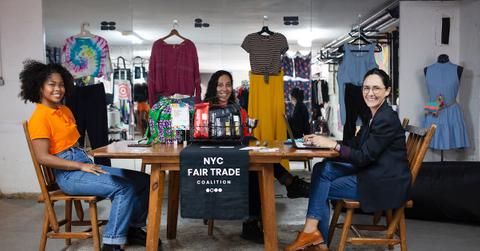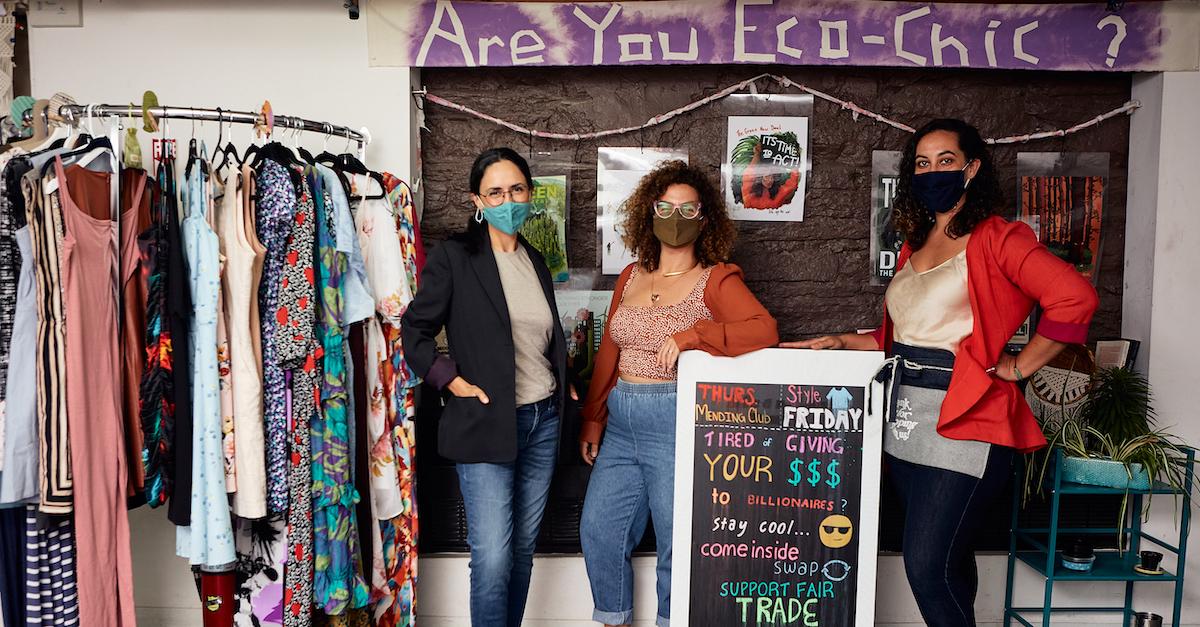Harlem’s Sustainable Fashion Community Center Lets Customers Swap and Shop (Exclusive)
Published Sept. 14 2021, 2:10 p.m. ET

Between pollutive material production, water waste, and oftentimes exploited workers, the fashion industry can have an extremely negative impact on our planet. Therefore it's crucial that brands, stores, and designers be as mindful of their environmental impacts as possible — which is why we're completely obsessed with the Sustainable Fashion Community Center (SFCC) in Harlem. The storefront lets customers pay a fee to "swap and shop" on the first floor, with a fair trade market on the top floor.
"According to Clotaire Rapaille, author of The Culture Code, fashion is about reconnecting with life as opposed to shopping which is a utility," Andrea Reyes, Events Chair at NYC Fair Trade Coalition, explains to Green Matters via email. "Swapping allows us to touch, try on, and experience the fun in fashion again, something missed since online shopping took hold. Consumers are encouraged to clean out their closets first, often an emotional release, and play dress up."

The SFCC is a major economic boost after the COVID-19 lockdowns.
Nonprofit organization Chashama works to fill closed storefronts with diverse artists and small businesses, so after the 2020 COVID-19 lockdowns, they had quite a bit of work to do. Hayley Ferber, Chashama's Deputy Director, tells us via email the organization partnered with New York City Department of Small Business Services to create the Storefront Startup Program in February 2021, to boost the economy and hopefully help business owners seeking out space.
"Storefront Startup matches a diverse group of entrepreneurs with free storefronts to provide business owners with a physical platform so they can sell their artisan products and services directly to the public," she explains. "With no-cost space, new businesses gain visibility and exposure in their community, and can conduct market research directly with potential customers to determine if there is a market for their wares without taking significant financial risk."
"They also receive assistance with marketing and communications from our staff, networking opportunities to identify and engage potential investors and partners, and free amenities including WIFI and electricity," she continues.
So when an empty space in East Harlem came about, it was up to them to fill the space with an unproblematic business like the SFCC.
Storefront Startup brought the SFCC back to life.
Through the partnership, Storefront Startup adopted the SFCC, which had first opened in 2019 via the NYC Fair Trade coalition in a small WeWork space in Times Square. Storefront Startup resurrected it in this larger Harlem storefront, giving them two floors and more than enough room.
"Although the pandemic set us back in a number of ways it also allowed us to deepen our connection and build a stronger relationship between members. The SFCC 2.0 relaunched in May 2021 after months of planning and the opportunity presented by Chashama through the Startup Storefront program," Reyes explains.
The SFCC has been a fun and eco-friendly addition to Harlem's fashion scene.
The SFCC is definitely a fun place to visit, and it's making a difference.
"'Take another piece, you can always bring it back,' is a popular phrase at the SFCC and not to worry about sizing, price, or whether it will last in their closet," Reyes says. "Swappers are able to take up to 10 items for $15 and can play with 'lewks' and experiment with their style.
"Our hope is once they donate items that no longer serve them and pick up 'new to them threads' they will head up to the gift shop and want to learn how to consume in a way that does no harm to the people who make them and the environment which the materials come from," she continues.
And although those behind the SFCC didn't realize how well they would be received, Reyes says it's making a difference in a neighborhood that's often afflicted with environmental racism.
"The neighborhood is interested in us, enjoy the active visitors from near and far and have embraced us with many seniors from the local senior centers visiting every day," Reyes tells us. "We wanted to be in a neighborhood that needed us and with Harlem’s vibrant scenes, immigrant communities, and high populations of residents who have suffered from environmental racisim and air pollution, we see a lot of good we can do in the community."